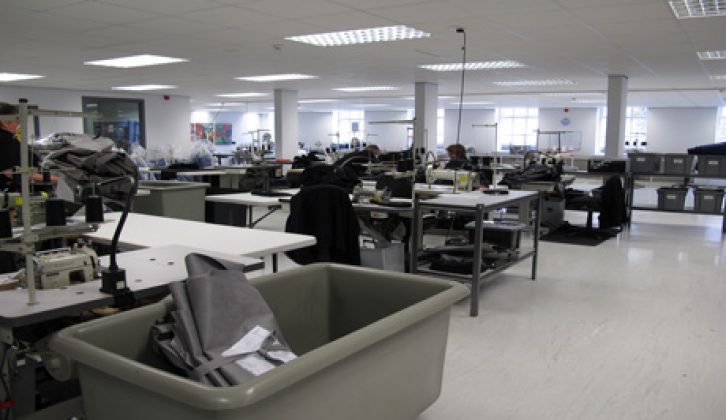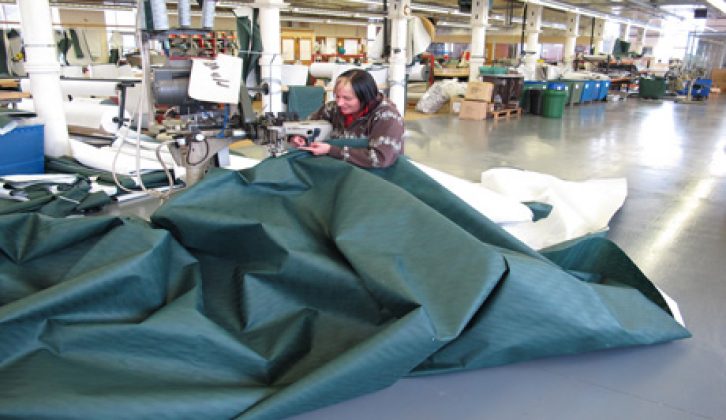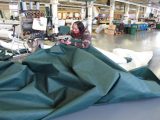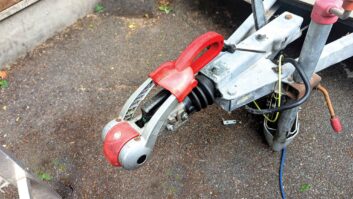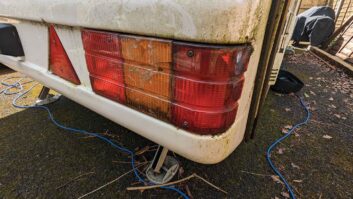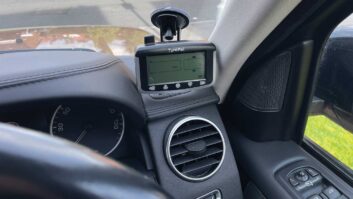Our industry insider Steve Trossell takes a close look at winter covers and explains what to look out for and how to fit it on your tourer.
Two decades ago, caravan covers were a rare sight, but the arrival in 1994 of affordable, lightweight, non-abrasive fabrics that combine water resistance and breathability changed that.
Now the UK market for storage covers is measured in tens of thousands per year and is still growing. Sales of towing covers, which protect caravan fronts from dirt, flies and damage in transit, have also taken off in recent years.
A trawl through forum threads and reviews of caravan covers reveals diametrically opposing views, typified by such comments as, “I’ve never had a caravan cover and don’t see why I need one” and “A great purchase. I don’t know how we could managed without it.”
The arguments for covering up are protection from rain-borne soil, tree sap, mould formation, UV degradation and improved security. Arguments against include inconvenience, paint or window damage, dampness and condensation – but regular users report none of these.
Two UK brands offer bespoke, made-to-measure covers costing between £250 and £450, and there are several brands of ready-made, imported covers from as little as £60 up to about £120. All make claims about water resistance, breathability and durability.
So what’s the truth? Should we cover up or not, and is it worth paying for a cover tailor-made in the UK? We went to Bradford, Yorkshire, the home of caravan cover manufacturing, to find out.
Specialised Covers was formed in 1981 to make tailored indoor and outdoor covers for prestige cars.
The family business has grown progressively in that market and boasts such long-time customers as McLaren, Bentley, Audi and Mercedes-Benz. Founder and chairman Douglas Long saw an opportunity to diversify into leisure vehicle covers, and worked with suppliers to develop a fabric that was affordable and performed well. Production was brought in-house in 1996; eventually it grew to about 30% of total sales.
The company now employs 50 people. The Shipley office and factory, which were designed and managed to meet the expectations of blue-chip clients, are impressively smart and orderly
Specialised Covers sells caravan covers direct to retail customers. The covers are tailored to fit each caravan’s size and shape and allow for aerials, flues and doorways. They are offered in grey, green and blue. A bank of more than 5000 patterns is held in stock and less well-known models are individually measured. Prices range from £250 to £420, with an average price of about £375.
Managing director Elliot Long explains about the exclusive fabrics the brand uses, saying: “We thrive on innovation and we are always developing new products for wide range of uses. I talk to our fabric suppliers most days.”
He emphasises waterproofness, strength and durability as key factors for caravan covers, and believes that breathability is a ‘given’ for the generic type of non-woven fabrics used by all suppliers.
“We use a polypropylene spun-bond fabric with three layers that are thermally bonded,” he says. “Its breathability is 1200g per square metre per 24 hours, and our evidence and customer feedback confirms that it works well. The fabric’s water resistance rating is 2000mm of static head; that’s actually waterproof, which we believe none of our competitors’ fabrics really are. A fabric that is only water-resistant lets water through in heavy rain; that has to be driven out again as water vapour and will leave soil behind.”
Elliot and Specialised Covers’ creative director, Katie Fishwick, are enthusiastic about the role of good design in building the market, especially for towing covers. “We’ve been inspired by the latest caravan designs, such as the Swift Conqueror’s,” Katie said, “and just knew owners wouldn’t want to hide them behind plain towing covers. We created a tailored-fit, two-colour design that retains the caravan’s identity.”
Pro-Tec Covers is another family business in Bradford, started in 1997 by Keith and Ann Proctor. Both come from the textile industry and diversified into manufacturing covers when the bulk of clothing production moved to the Far East. Originally they were one of Specialised Covers’ suppliers, but launched Pro-Tec to concentrate on the caravan and motorhome sector.
The Proctors’ daughter, Christina Mageen, manages production and administration and showed us around. As with many small West Yorkshire companies, it occupies part of an old mill. Fifteen employees do all the work in-house.
Like Specialised Covers, Pro-Tec Covers deals direct with retail customers and it makes a tailored product in grey or green from established patterns or individual measurements. Prices for basic covers range from £270 to £430 and average about £370.
Christina is proud of the personal service it gives customers and how direct contact with them stimulates new developments. “Our Easy Fit cover came from discussions with customers about fitting difficulties,” she said. “We designed it to make fitting a lot easier. The rear rolls up so the cover doesn’t have to be lifted as high, and we supply the poles to pull it over the van without having to use steps or ladders.
“The Duo Cover was the next natural development. Towing covers have become popular and it was natural to combine one with a storage cover so customers didn’t have to buy both.”
Christina also explained the growing demand for personalising covers with logos, flags or perhaps security-related message, such as “This caravan is fitted with an alarm.” We were shown a complicated machine, just being commissioned, which can be programmed to embroider such details – it’s much more durable than a transfer print.
Pro-Tec uses a three-layered, polypropylene spun-bond fabric that emphasises breathability. Christina explained, “At shows we demonstrate our fabric and customers are amazed that they can actually breathe through it, then watch it support a 1000mm head of water without seepage. That is the level at which fabric qualifies as waterproof. Our fabric’s breathability rating is 2400g per square metre per 24 hours; we believe it’s important.”
We left with good impressions of both companies and were convinced caravan covers make sense. Users report that they don’t damage bodywork or cause damp. They let you avoid the work of cleaning off mould and tree sap stains, and they reduce degradation from UV light. With the van’s exterior protected, the cost of a £370 cover may well be recovered in a better resale price.
Although Specialised Covers and Pro-Tec promote material specifications that emphasise waterproofing, UV protection and breathability to different degrees, customer feedback suggests both brands perform well. According to tear-strength measurements, the fabric used by Specialised Covers may have the edge in durability. Both firms offer three-year warranties.
You don’t have to spend £370 to get a caravan cover. Ready-made models are available from several retailers and cost about £100 for a typical size. Many are imported by Birmingham-based wholesaler Maypole, so we spoke to the company to find out what you get for your money.
Maypole caravan covers are made in China and are available through accessory retailers and caravan dealers. They come in grey or green and, to keep costs down, have just six sizes for caravans with body lengths between 4.1m and 7.4m. They strap underneath the van and have elasticated skirts, but extra strapping may be required to ensure a close fit and avoid damage caused by flapping.
No specific allowance is made for protrusions, such as aerials or flues. There is also no doorway flap, so you enter by unzipping the rear, which can be rolled up; this also eases pulling the cover on.
The fabric is spun-bond polypropylene but has a fourth, water-resistant layer. Water resistance specification is 1000mm static head and the company claims breathability and UV stability are good.
We do not have access to comparative test results, but this fabric appears less durable than that used by Specialised and Pro-Tec and the warranty is just one year, compared to their three. Overall, the product differences are tangible but the lower prices reflect this adequately and they offer a valid alternative to the UK-made bespoke covers.
The arguments for covering your caravan include protection from rain-borne soil and tree sap
